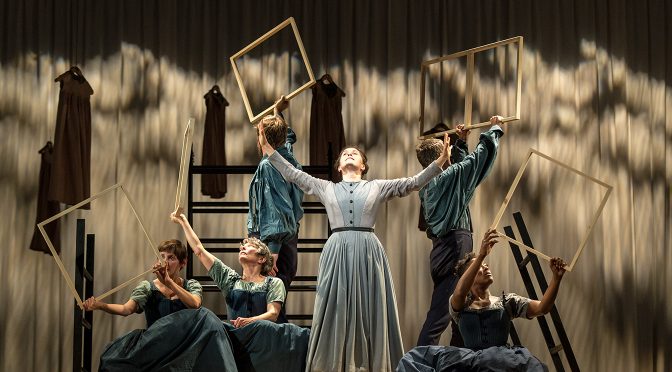After its crowd-pleasing offering last week, with One Man Two Guvnors, The National Theatre presents an adaptation of Charlotte Brontë’s classic that started life at the Bristol Old Vic. It’s a marked contrast, with a worthy air, that tells the story of everyone’s favourite orphan governess through movement and imaginative touches in a self-consciously theatrical fashion. I suspect this is the kind of show that suffers most when filmed, as the atmosphere doesn’t carry, and its failings are exaggerated.
A first flaw comes with Benji Bower’s musical direction, a confused mix of styles from Noël Coward to a Kyrie eleison. The execution is great, especially Melanie Marshall’s singing, but avant-garde touches come close to cliché and parts make no sense: why choose Mad About the Boy, denying the “flurry of a first affair”, when that is exactly what Jane is experiencing?
Sally Cookson’s direction has some inventive touches. Many connect to the lighting design from Aideen Malone, which is strong. But there are too many obvious moves, literally – the direction of movement (from Dan Canham) is predictable, while costume changes scream their import. There’s too much running on the spot and too much climbing up and down the ladders that make up Michael Vale’s set. There’s also a cast member performing as dog – never a good sign.
A relatively small ensemble might be expected to shine given how hardworking they are, but the characters, like the accents, are too broad to impress. Thankfully the leads are a success. Felix Hayes makes a good love interest for Jane; his Mr Rochester is convincing as both a profoundly tortured soul and a “trite, commonplace sinner”. Aided by a beautiful voice, Hayes even manages to say “humbug” without getting a laugh.
In the title role, a mammoth part, Madeleine Worrall is very good. Eminently watchable, Worrall does well with Jane’s fighting spirit and winning dignity. As she holds her own against authority, we see her characteristic balance of common sense and passion. And with the latter, Worrall shows us Jane’s intense emotions, focusing on the painful romance in the story and establishing a great chemistry with Hayes.
Worrall’s achievement is all the more praiseworthy given that, unlike Brontë’s heroine, she seldom addresses us directly. This key ingredient feels skipped, while the plot is followed slavishly. Frustratingly, the answer is onstage – Jane’s famous first-person narrative appears when the ensemble doubles as an inner dialogue. The technique works well, but it doesn’t happen often enough. The result, despite a long running time, is a Jane Eyre that conveys little to us and ends up feeling slight and skimpy.
Available until Wednesday 15 April 2020
To support visit nationaltheatre.org.uk
Photos by Manuel Harlan


